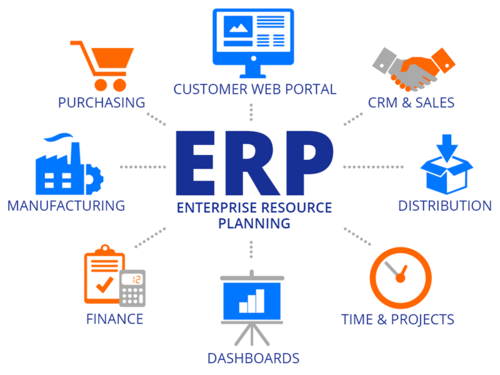
1. How does ERP create value for your business and employees?
For any organization, creating values, increasing efficiency and productivity is the main goal irrespective of the size and type. ERP systems are actually a boon to any company as they benefit the businesses in multiple ways. ERP systems are gaining tremendous popularity in recent times with the implementation and integration of the latest technologies making it way simpler and effective.
For streamlining the process of any SMB’s or businesses at large, Enterprise Resource Planning (ERP) system plays a pivotal role in managing and integrating various departments like distribution, finance, human resource, inventory and all other departments.
To put it on a more simpler note, companies require software to manage purchases, products, services, sales, finance, accounts and people more efficiently and effectively. That’s exactly when Enterprise Resource Planning systems come into the rescue.
2. What Exactly is ERP?
Software solution that helps in standardizing, streamlining and integrating various business processes across fields like distribution, inventory, human resource, finance, CRM and many more is an ERP. It uses a single database and functions on an integrated software platform.
3. What is it used for?
ERP system helps in improving the effectiveness and efficiency of enterprises in the following ways.
- Integrating orders using order management module
- Integrating financial information using finance module
- Customer relationship management tools
- Standardizing and automating the manufacturing processes
- Standardizing procurement processes
- Standardizing HR related information
- Facilitating reporting for government regulation, etc.
4.Various Benefits of ERP systems
ERP helps in improving the performance of the companies in several ways. More specifically:
– Helps in decision-making process by speeding up the collaboration
– Regulates internal efficiency and increases productivity
– Increases agility and potential for various associations
– Enhances security with a centralized database
6. The Key Features of an ERP System
Although the functionality, scale and the scope of the ERP systems vary widely depending upon the field it is used in, here are some of the common features of ERP software listed below
- Helps in integrating the end-to-end process of business across departments and units
- Helps in integrating with customers and vendors
- All the departments use this common database using the same definition making the implementation more successful
- Real-time operations helping in increasing the performances
- The consistent user interface helps in reduced costs and saves time
- Helps in eliminating inefficiency in businesses and cost overruns, integrates all the processes to run a company
7. How Does ERP Create Value for Your business and Employees?
ERP helps in organizing, streamlining and providing values to the company, its employees and customers by unifying the departments, thus adding values as a result.
It helps in creating a workforce that’s well structured, motivated, and empowered, leaving no room for friction between departments.
Not just that, it also helps in enhancing the coordination among various transactions and saves a lot of time.
The client and the customer’s relationships are well maintained and thus it helps in the overall increase in productivity and profits.
For reading more about ERP systems, various career opportunities and training, checkout our other articles.
